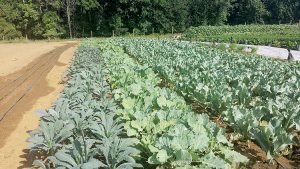By Gretchen C. Van Benthuysen
As the inaugural growing season winds down at Caramore Farm in the Wickatunk section of Marlboro, it’s clear that more than vegetables have been cultivated.
The farm not only supplies shareholders with 20 weeks of locally grown food, it serves as a teaching tool for students who attend the nearby Collier High School (150 students) and Middle School (55 students), particularly those in its extended summer program.
About 80 area school districts send children to the Collier School, a state-approved, private, nonprofit school for students with disabilities whose needs cannot be met in public schools.
The 4 1/2 acre community supported agriculture (CSA) farm is the newest program offered by Collier Youth Services, which also administers the high school and middle school, Collier Group Home for teenage girls in Red Bank, Collier House in Keyport for homeless or foster care girls transitioning to adulthood, and Kateri Day Camp in the summer.
Cynthia D’Arcy, assistant executive director of education, said students may have learning disabilities, behavioral problems or emotional stresses, and are considered at-risk youth. Counseling also is a component combining individual and group therapy.
“These are students that are struggling in the public school system,” she said. “Really, a lot of them just need a smaller, nurturing environment and they do well. We thought this program went along with our mission and we opened the farm this summer.”

The schools and farm share a 250-acre campus at 160 Conover Road.
“We try to take advantage of our different programs,” D’Arcy explained. “Although this farm is completely separate from our two schools, it lends itself to helping students on an academic level. They can get exposure, they can get work experience, they can learn.”
This year the high school agriculture/science class transplanted seedlings from the greenhouse to the garden. Students in the building trades program will build planters for the greenhouse. The culinary arts program will have access to ingredients for school lunches.
D’Arcy said students also benefit emotionally.
“Being outside, getting their hands dirty, helping nurture life … the cathartic release will be of invaluable help to our students,” she said. “You always feel good when you’re working outside in beautiful weather.”
For six weeks this summer, students spent two hours a day on the farm planting, thinning, weeding, hoeing watering and learning what goes into growing vegetables.
Three of those students included Ethan Lederman, 15, Naomi Bell, 17, and Jose Martinez, 15. They don’t plan to be farmers, but said they learned a lot.
“I enjoyed everything, but the thing I enjoyed most was the weeding, whacking them down,” Jose said.
“I liked weeding around the potatoes. When I looked back after it was done it was very satisfying to see,” said Ethan, adding they also were able to take vegetables home. “It’s good that it’s an organic farm because you have to pay extra for organic at stores. Both of my parents are vegans, so they always focus on farming and vegetables.”
Naomi also liked cultivating potatoes.
“It was very physical, but also satisfying,” she said. “You can see your progress and you feel like you accomplished something.”
The farm sold 31 shares at $750 each to Collier employees, with some people dividing shares, for a total of 54 participants.
“Even if they don’t want to be farmers its good to get farming experience,” said farm manager Kristin Hock of Middletown. “It gives them an appreciation of where their food comes from and maybe it makes them eat healthier. Whether it was making flower bouquets for our members or just seeing a really weedy field, they know they made a huge difference.”
Caramore Farm is not certified organic — yet — Hock explained, saying it can take three or more years of cultivating and “a lot of paperwork” before that happens. But she follows organic practices and 97 percent of seeds planted were organic.
Future plans include expanding the size of the farm and selling shares to the public. Meanwhile, work-share arrangements can be made through Hock who said that’s how she got involved in farming: work a certain number of hours per week and get paid with farm produce.
“This first year the goal was to get the farm up and running,” said Hock, who has a bachelor’s degree in animal science and wildlife conservation from the University of Delaware and master’s in Environmental Education from Expedition Education Institute.
“This winter we’ll sit down and talk about how we can incorporate the students more, whether it’s them coming down here helping on the farm or analyzing the soil,” she explained. “Future years might involve the students in planning the garden using math and science skills.”
Often, she said, the students don’t realize they are learning.
“It’s fun having the kids come on Wednesday, really apprehensive about getting down and dirty, and by Thursday I can hand them a weed and tell them, ‘This is an edible weed,’ and they eat it,” Hock said. “It’s cool to see that transition.”
Even the school’s staff is paying attention.
“We’re all getting an education in general. We didn’t know there were 18 kinds to lettuces,” D’Arcy said. “Kristin does a great job sending an email to all of our shareholders with everything that’s in our weekly pickup, with recipes that go along with the produce.
“It’s a morale booster, too, as we’re all talking about it. “We even talked about opening a farm market,” she said. “We’re thrilled about the progress we made in such a short time.”
For more information, email khock@collieryouthservices.org.














